JUMBOS UNDER FIRE
Wanted — a new home for up to 50 wandering African elephants
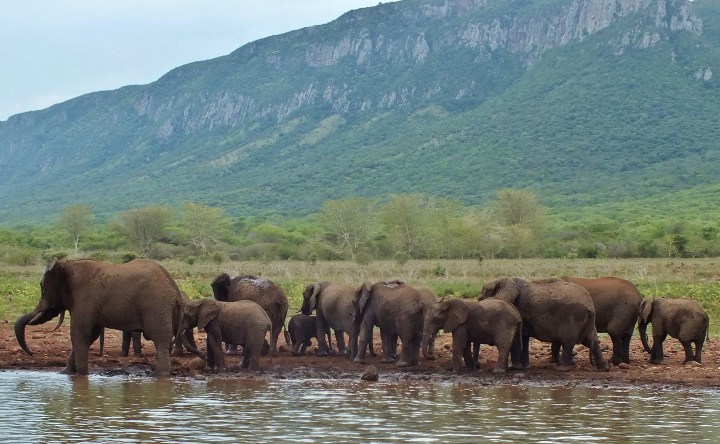
Over the past few months, their future has become desperate, with at least six (and possibly as many as 25) of the animals shot and killed by local residents due to human-wildlife conflict and deliberate poaching attacks inside a proclaimed nature reserve.
Another elephant has been butchered for its meat and tusks along the shores of Lake Jozini/Phongolapoort Dam in KwaZulu-Natal as a wandering herd of homeless elephants continues to seek refuge from human persecution.
Two non-government wildlife organisations have offered to catch and translocate the animals to a new home at no cost — but so far, no local landowners have put up their hands to provide permanent sanctuary for the elephants.
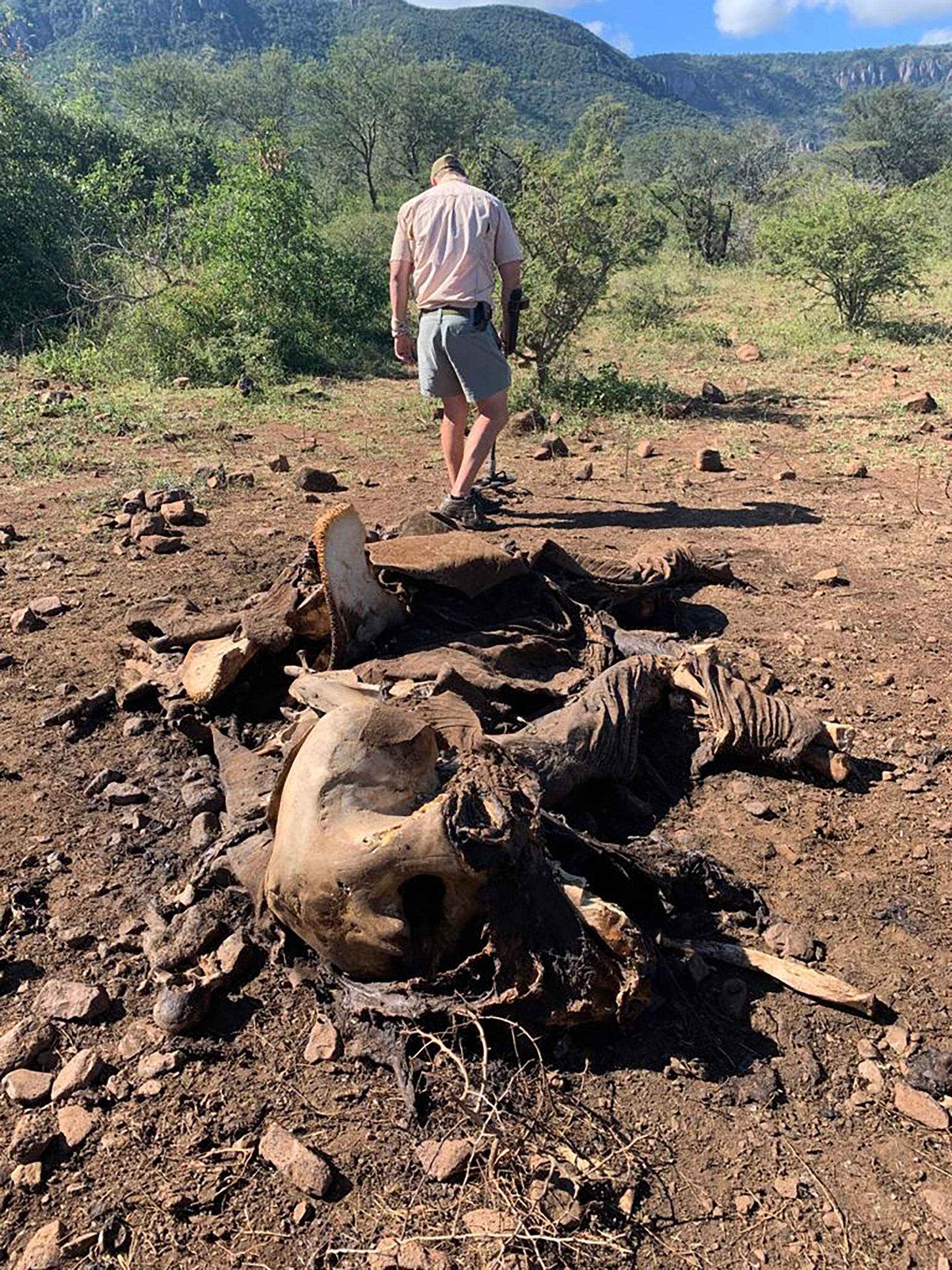
Little more than skin and bone remains on the carcass of another elephant poached in the Ezemvelo Phongola Nature Reserve. Both tusks were removed. (Photo: Supplied / Ezemvelo KZN Wildlife)
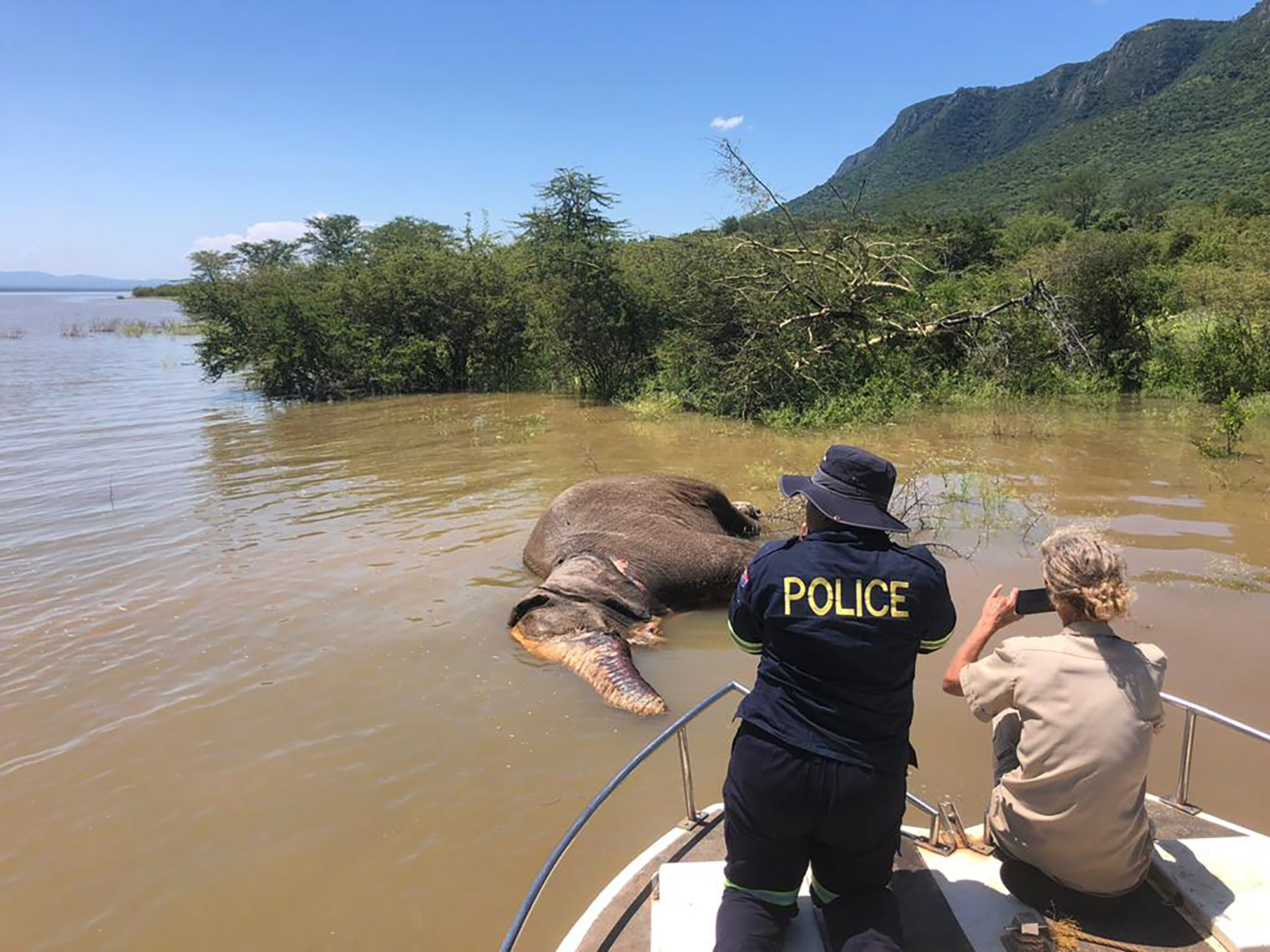
The poached carcass of an adult elephant floats close to the shoreline of Jozini Dam. Somewhere between six and 25 elephants have been killed along the lake shoreline over recent months. (Photo: Supplied / Ezemvelo KZN Wildlife)
The herd, originally comprising about 90 animals, left the privately owned Pongola Game Reserve on the western shores of the lake nearly seven years ago when the water level dropped during a severe drought.
The animals have since found temporary refuge in a private reserve in Eswatini (Swaziland) and within a provincial nature reserve on the eastern shores of the lake.
But, over the past few months, their future has become desperate with at least six (and possibly as many as 25) of the animals shot and killed by local residents due to human-wildlife conflict and deliberate poaching attacks inside a proclaimed nature reserve.
The exact number of casualties is not clear due to poor access in the area on the border between South Africa and Eswatini, but the latest freshly butchered carcass was spotted at the weekend during a helicopter reconnaissance flight.
It is understood that the remaining herd has now split into two groups, with one of about 10 elephants hiding in dense bush in KZN to avoid further casualties and a second of about 40 safe for now in the Royal Jozini Private Game Reserve in southeast Eswatini. Some of the animals are thought to be wounded from shotgun pellets and bullets.
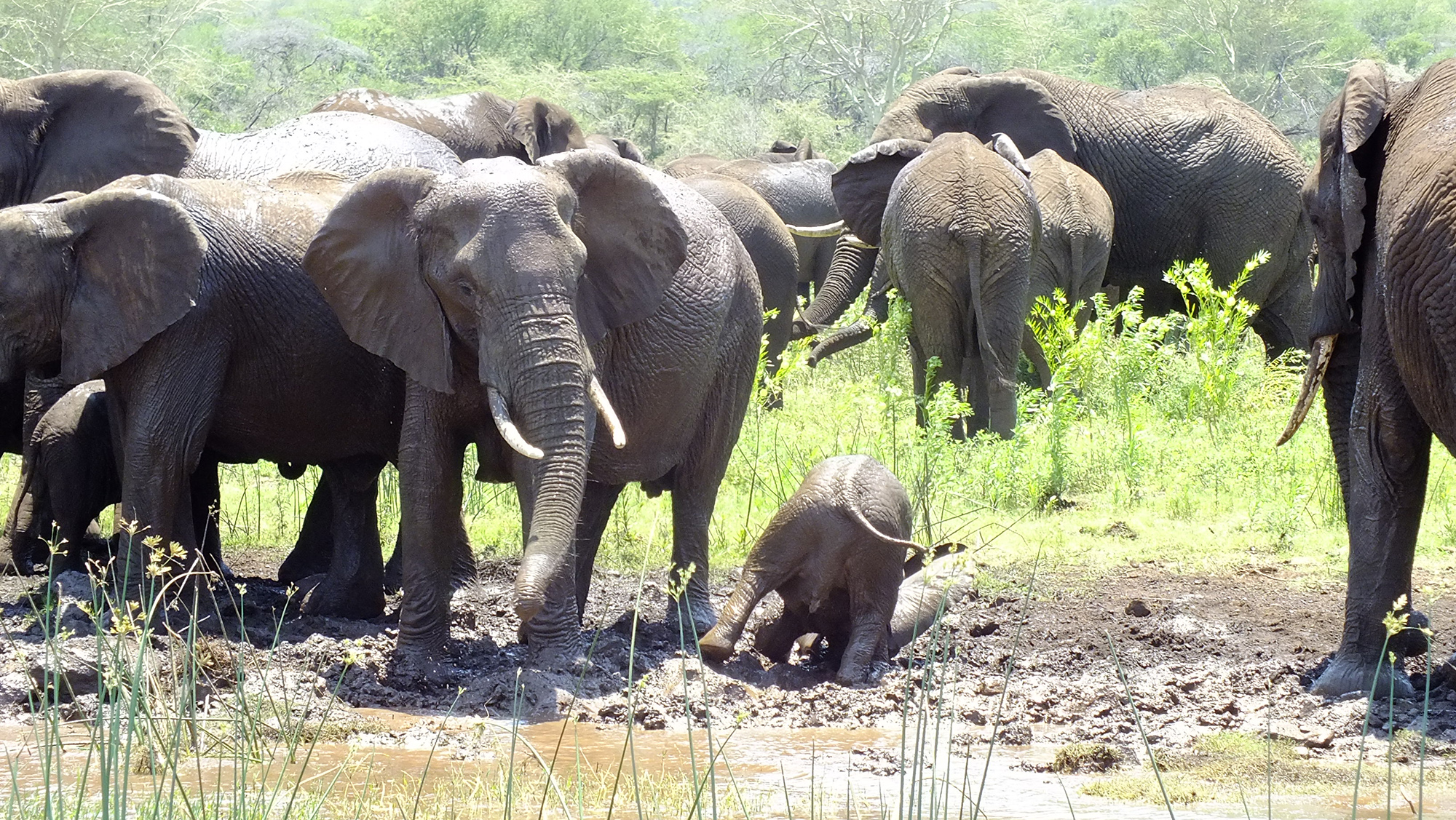
A calf romps in the mud under the watchful eyes of its mother. (Photo: Heike Zitzer)
Now the herd is in a situation where the former owners no longer wish them to return. The Eswatini reserve says it cannot provide permanent refuge and the Ezemvelo KZN Wildlife conservation agency also wants them out of its reserve.
Tensions have risen so much that, last month, foreign tourists came under fire while trying to catch a glimpse of the elephants from the deck of a double-decker floating tour boat. The assailants were believed to be hunting the herd when the incident took place.
Read more in Daily Maverick: “Jozini Dam: Twenty-five slaughtered elephants later, tourists in a viewing boat come under poachers’ gunfire”
Heike Zitzer, a local wildlife researcher who monitored the herd closely until 2019, has launched an appeal for landowners in South Africa or neighbouring nations to provide a new, permanent home for the persecuted herd.
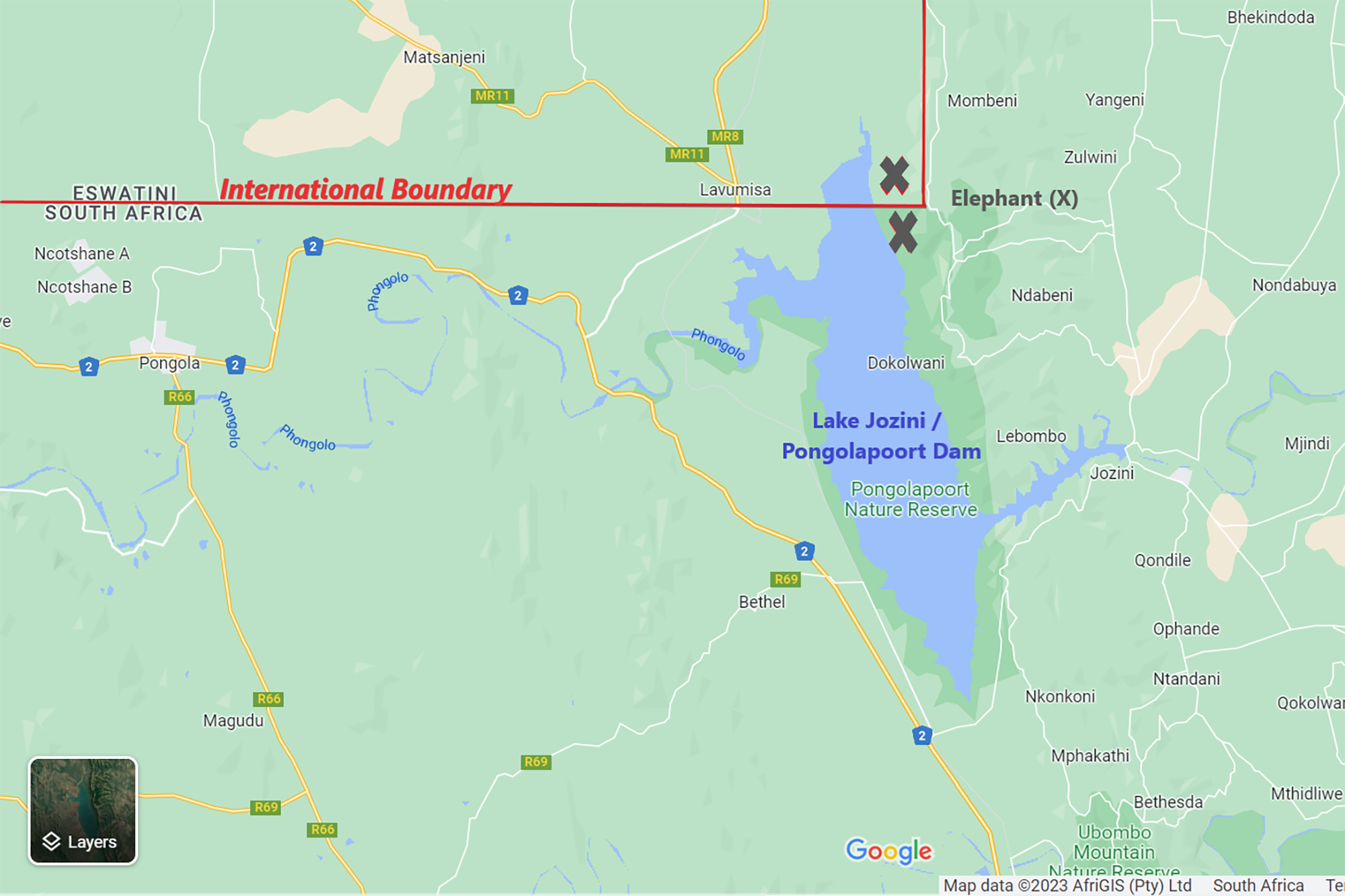
Google map showing current Phongola elephant locations. (Image: Google Maps)
According to Ezemvelo KZN Wildlife, the former owners of the elephants (Pongola Game Reserve/Karel Landman Trust) were “reluctant” to take the animals back.
The reserve brought in a founder population of elephants in 1997, but after the herd grew the owners said they had been refused permission to cull or to hunt the animals commercially.
In an opinion piece published by Africa Geographic last year, Pongola Game Reserve general manager Malcolm Thomson said: “The current situation regarding elephant management and maintenance of elephants on private property in South Africa has led to many private landowners who have elephants on their property having to rethink their positions on whether to keep them there.
“Many reserves are not dependent on the tourism value of these elephants. Current legislation, and the national norms and standards regarding their management, place so many restrictions on elephant management that, for many, it is no longer practical, viable or economically sustainable to host elephants.”
“We also applied for the culling of 86 elephants as the population was already way above the reserve’s carrying capacity of 30 elephants. Our pleas were ignored with no sympathy or understanding for our situation.”
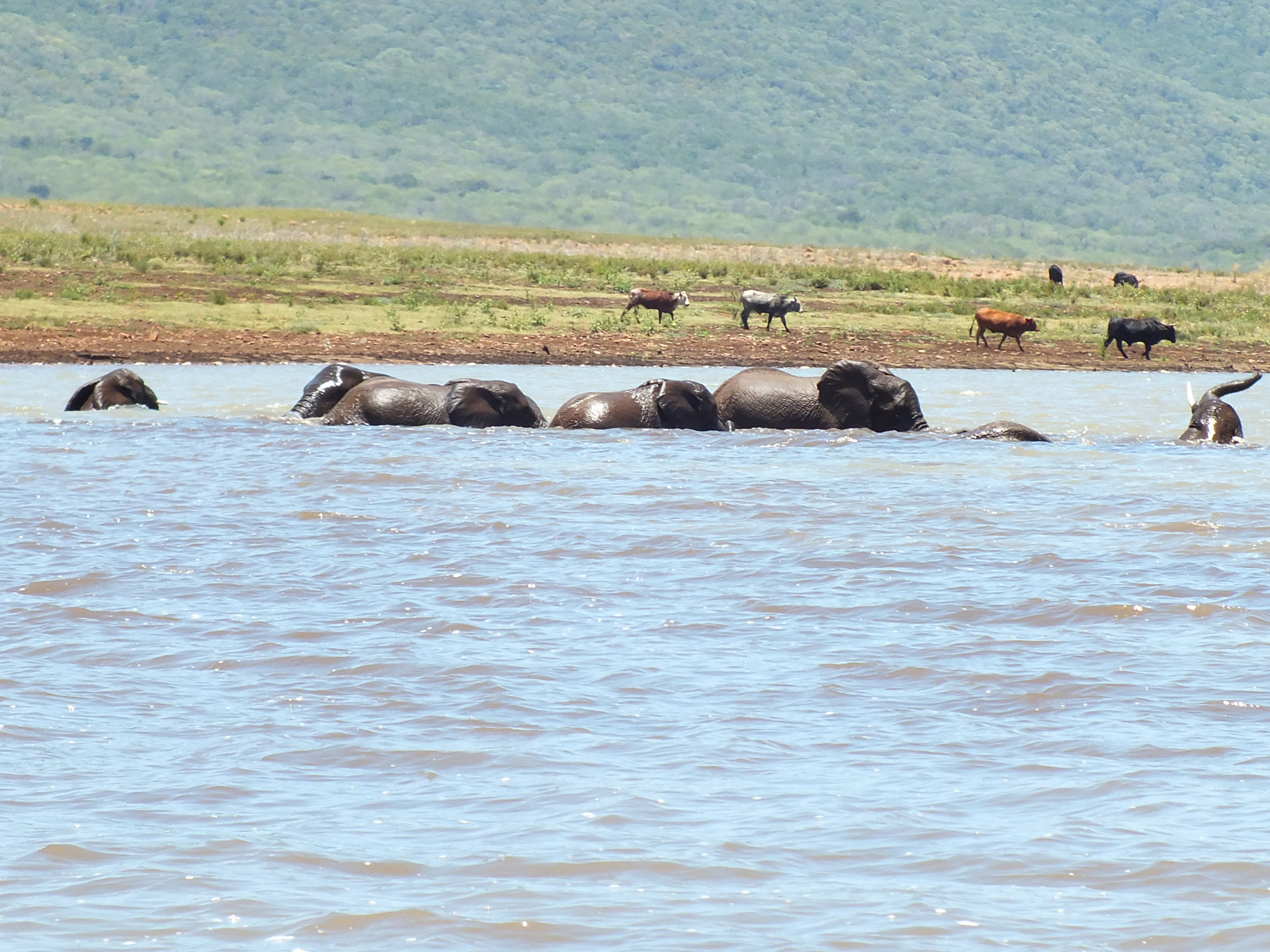
Cattle graze alongside elephants inside Ezemvelo’s Phongola Nature Reserve. The presence of both animal species in the reserve has led to conflict with local community members, some of who have demanded that they will keep killing the elephants unless they are moved out. (Photo: Heike Zitzer)
Thomson argued that elephants would soon begin to disappear from private property as they “no longer have any benefit to the private landowners, who are prevented from maintaining a viable and productive conservation business”.
‘Far too many elephants’
“It is hard to argue that elephant populations in South Africa are in crisis, as many try to. Most elephant populations in South Africa substantially exceed the carrying capacities of the properties on which they occur. This is directly due to the legislative management restriction imposed by the government. The only crisis is that there are far too many elephants and nowhere for them to go,” he claimed.
In a rebuttal piece, conservationists Pete Ruinard and Paul Cryer argued that Thomson’s article was “filled with inaccuracies, not only about general elephant management and its applicable laws, but also regarding the long process of building scientific and managerial knowledge about elephants living in relatively small and contained reserves.
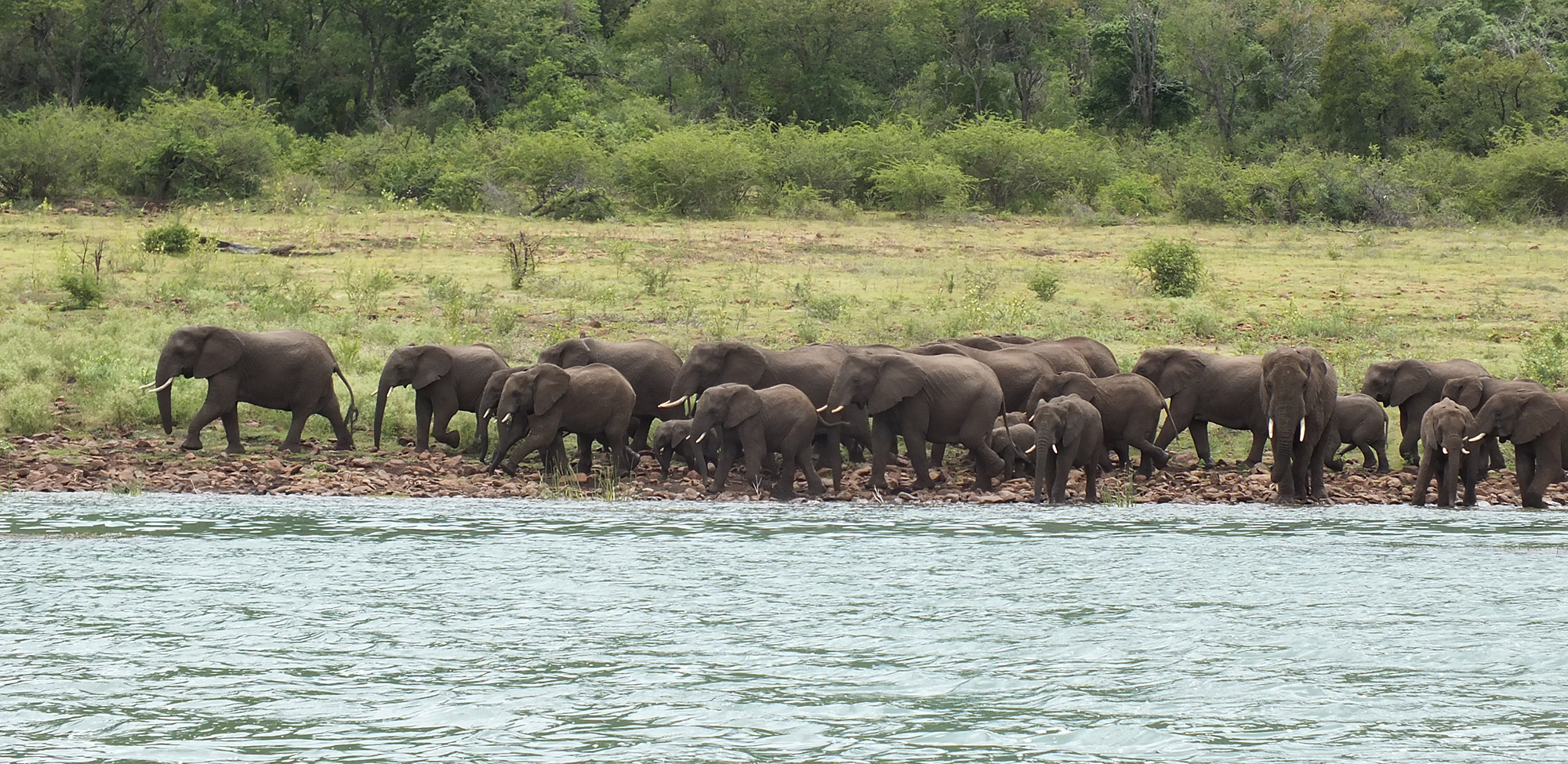
Free to a good home. Part of the elephant herd that has been wandering between KwaZulu-Natal and Eswatini (Swaziland) for the past seven years. (Photo: Heike Zitzer)
“Elephant management must be viewed from several geographical and temporal scales simultaneously, from continental and national perspectives to small fenced reserves. Even the roughest estimates of elephant numbers show a dramatic decline in Africa over the last hundred years, so it is misleading to argue that Africa has too many elephants, and their endangered status confirms this.
“When viewing the broader situation, the issue of localised areas with too many elephants is a problem of distribution rather than over-population. This is especially so considering that 76% of Africa’s elephants are transboundary.”
Ruinard and Cryer also noted that the Pongola reserve had refused an offer by the Humane Society to fund an elephant contraception programme for three years at no cost to the reserve.
Knowledge of elephant translocation had increased greatly over the past two decades, with routine operations conducted today that were unheard of 25 years ago.
“Progress regarding the logistics of moving elephants and the technical means of capturing them, combined with veterinary advancements, is resulting in ongoing improvements that secure the greater well-being of individual elephants and family/group structure.
Visit Daily Maverick’s home page for more news, analysis and investigations
“This facilitates a far greater success rate with translocations. It also increases the distances that elephant groups can be moved. This, in turn, means that the possible sites for translocations are growing in number and distance from the source population: elephant translocation can now be viewed from a continental perspective.”
Meanwhile, Ezemvelo KZN Wildlife has confirmed that two wildlife NGOs, the Aspinall Foundation and Conservation Solutions, had offered to translocate the elephants back to the Pongola Game Reserve or take them to any national and international protected areas with adequate carrying capacity for elephants.
“The first batch will probably be translocated in March/April 2023 should the new protected areas be secured.”
However, it could take more than a year to translocate them outside the country if no suitable space was available in South Africa.
Ezemvelo said several discussions aimed at finding an amicable resolution to the issue had failed over recent years as there had been “some reluctance” by the Pongola private reserve to take the animals back.
Ezemvelo said it was aware of only five confirmed cases of elephant poaching on the eastern shores of Jozini. However, elephant monitor Suzette Boshoff believes 25 of the original herd of 74 elephants appear to have been poached in recent months.
In one of the most recent incidents, an elephant carcass was spotted by a helicopter team on Saturday. Both tusks had been removed and meat cut from the carcass.
Zitzer remains hopeful that her appeal for landowners to shelter the Pongola herd will be successful. She can be reached by email at [email protected]. DM






















 Become an Insider
Become an Insider
No words, just no words. What are we doing really? Thank you Tony for highlighting the plight of these important animals, hopefully someone will step forward at speed.
Less and less space for these beautiful animals because of more and more people. When is enough?